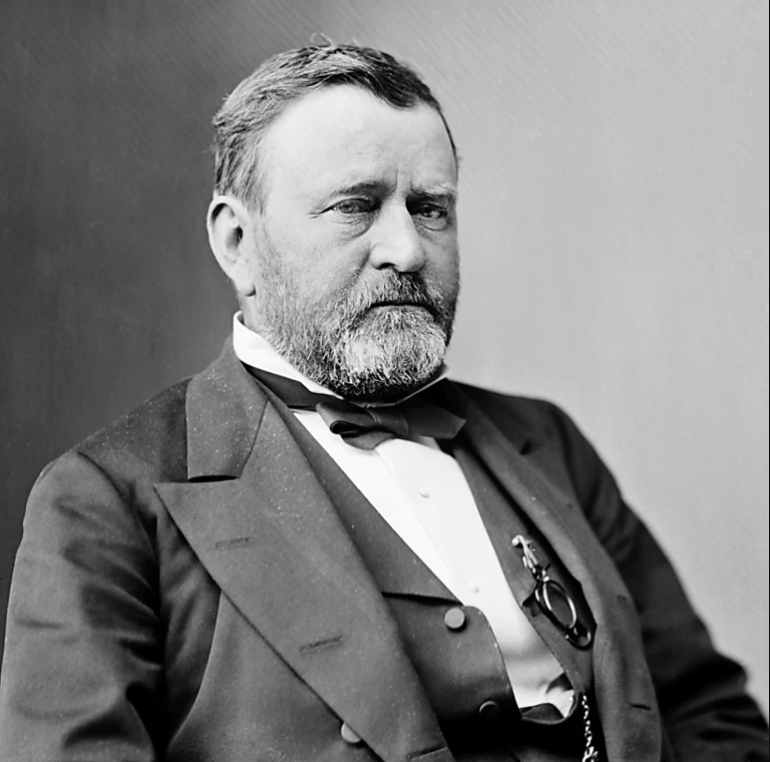After leading the Union Armies to victory in the Civil War, Grant was elected to be the 18th President of the United States. His presidency was goaled at restructuring Congress and erasing any remnants of slavery from the United States.
Early Career
Ulysses S. Grant was born to Jesse Root Grant and Hannah Simpson in 1822. Grant was born and raised in Georgetown, Ohio, where refined his horse handling skill throughout his childhood. After succumbing to his father’s pressure, Grant was appointed to and attended West Point Military Academy. Grant was praised at West Point for his horsemanship and excellence in mathematics. In 1843, Grant graduated 21st in his class, and was soon after assigned as a second lieutenant to the 4th U.S. Infantry in St. Louis, Missouri. After falling in love with Julia Dent, who would later become his wife, Grant left to serve, with distinction, in the Mexican-American War.
Upon his return, he married Julia Dent, with whom he had four children. He worked at his father’s leather store in Illinois until the Civil War broke out. The Governor appointed grant to command a rowdy volunteer force in Galena. Because of his success, he was elevated to the rank of brigadier general of the volunteers. Grant’s goal was to gain control of the Mississippi Valley. To fulfill this goal, he first gained Fort Henry and attacked Fort Donelson. After this move, the Confederates asked for his terms, he gave them no option but to surrender – and they did so. After the confederate surrender, Lincoln promoted grant to major general of the volunteers.
In April of 1862, Grant fought one of the most gruesome battles in the West at Shiloh. Despite the fact that Grant physically suffered, Lincoln insisted on keeping him because of his will to fight. Grant then directed his attention towards what would be called the “Vicksburg Campaign.” If his fleet successfully won Vicksburg, a city in Mississippi, they would divide the Confederacy in two. With Grant’s leadership, Vicksburg was captured and the Confederates faced a major loss.
After another historic win in Chattanooga, Lincoln promoted Grant to General-in-Chief. He spent thirteen months battling Confederate Robert E. Lee. In April of 1865, Lee surrendered to Grant. Only a week after Lee’s surrender, Lincoln was assassinated leaving Andrew Johnson as president. Grant was promoted by Johnson to General of the Army, but soon after, Grant and Johnson openly differed over Reconstruction policies and Grant used the Reconstruction Acts, despite Johnson’s veto, to extend civil rights to freed slaves. The political differences between Grant and Johnson inclined Grant to align himself with the Radical Republicans. He was unanimously nominated by the Party and was elected president in 1868.
Presidential Tenure
Upon his entry into office, and following a period of military success, the American people were hopeful for his presidency. Grant successfully stabilized the nation’s post-war economy, destroyed the Ku Klux Klan, instituted Congressional Reconstruction, and ratified the 15th amendment. He employed military force when necessary in his radical reconstruction efforts in the South. Ultimately, the Union was fully restored during his presidential term.
Despite Liberal Republican and Democratic allegiance against Grant’s re-election campaign, he was still victorious in the presidential election of 1872. Throughout his tenure, he fostered peace both domestically and internationally. He encouraged Native American assimilation and maintained relatively peaceful foreign policies. Grant became and continues to be a symbol of national unity.
Following his presidency, Grant returned to financial hardships in his retirement. After being diagnosed with throat cancer, Grant began writing to mitigate his debts and support his family. Towards the end of his life, he authored a memoir that would produce nearly $450,000. But he was unable to celebrate his success as he succumbed to his disease upon completing his memoir. Grant passed away in 1885 and is remembered today for his civil war and presidential contributions.






